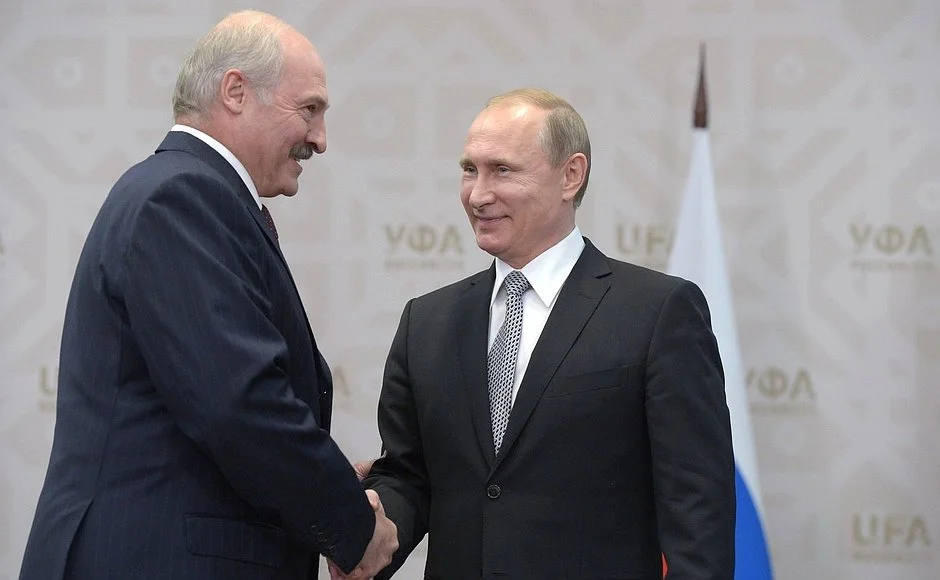Ukraine isn’t the Only Country Whose Future Lies in Putin’s Hands
Belarus, led by the Putin-friendly Alexander Lukashenko, is among the Eastern European and Caucus states which will feel the ramifications of the war in Ukraine. (Wikimedia Commons)
In the January 18 episode of Pod Save the World, co-host and Former Deputy National Security Advisor of the United States Ben Rhodes said, “The ripple effects from what happens in Ukraine are really going to shape obviously not just Ukraine itself, but Russia and a number of other countries.”
As we near the one-year anniversary of Russia’s invasion of Ukraine, this quote feels especially pertinent.
President Volodymyr Zelensky warned in a recent video address, “Russia is now gathering forces for another escalation.” He also reminded Ukrainian supporters that the war “is important for global democracy—for all those who value freedom.”
Zelensky’s message rings true: The war in Ukraine will undoubtedly have profound effects beyond Ukraine and Russia, and it will likely alter the global order. More immediately, the outcome of the war will alter the economic, political, and social futures of several countries in the region.
Here are the countries whose immediate livelihoods are dependent on the result of the war:
Belarus
Belarus, a former member of the Soviet Union, has consistently supported Russia. It is of strategic importance to Russia, sharing a 700 mile border with Ukraine, some of which lies close to Ukraine’s capital, Kyiv.
Belarus has long been an ally of Russia, but much of the country’s current support—or dependency—derives from the choices of President Alexander Lukashenko.
Upon taking office, Lukashenko quickly propelled initiatives backing Russian language and joined an “on-again-off-again effort to create a single country with Russia.”
In 2020, Putin began solidifying his influence over Lukashenko, earning his allegiance by cracking down on opposition movements within Belarus. Putin later granted Belarus $1.5 billion in loans as well as lucrative oil and gas deals.
Thus, throughout the war, Belarus has been a beneficial ally to Russia, engaging in joint-military training, offering hospitals to wounded soldiers, and permitting the launch of Russian missiles from inside its borders.
The United States and its European allies have retaliated against Belarus’s involvement in the war by severing its access to global trade. In September 2022, the Department of Commerce expanded its sanction regime by imposing export restrictions on both Russia and Belarus. Similarly, the European Union announced it would sever Belarus’ access to SWIFT, the software that enables most global financial transactions.
So what will happen to Belarus after the war? According to analysis from the Carnegie Endowment for International Peace, if Moscow succeeds in shepherding Belarus into the war, it would likely engender a swift defeat of the country’s unprepared army, resulting in a massive political and economic crisis.
Regardless of whether or not Belarus joins the fighting, if Russia loses in Ukraine, the country will still reap massive economic ramifications, as it enjoys lucrative streams of trade from Russia to the rest of Europe, and its oil sector is heavily reliant on Moscow.
Azerbaijan and Armenia
Current violence along the borders of Azerbaijan and Armenia are also intrinsically connected to Russia.
Azerbaijan and Armenia have been engulfed in fighting for more than 30 years over the Armenian region of Nagorno-Karabakh. As part of a 2020 peace agreement, Russia is supposed to have 2,000 peacekeepers in Nagorno-Karabakh; however, the war has diminished Moscow’s ability to act in its usual role supporting Armenia.
Although Armenia has typically been one of Russia’s closest allies, Moscow has lessened its involvement in the conflict since the onset of the war. Still, Armenia relies heavily on Russia for security.
According to the European Council on Foreign Relations, “letting Armenia down would corrode [Russia’s] already-tarnished image as a security provider and destroy the Collective Security Treaty Organization’s] credibility,” which could be especially crucial as Russia has alienated the West and has scarce allies. However, supporting Armenia would offer no strategic benefit and only further alienate Azerbaijan.
In recent years, Moscow has made increasing efforts to thaw relations with Azerbaijan, using soft power tactics like supporting political movements and bolstering pro-Russia media to strengthen its image in the country.
Moscow has also deterred the European Union from interfering with the ongoing violence. In August 2022, Russian Foreign Ministry spokeswoman Maria Zakharova alleged EU involvement was a “‘pseudo initiative’ of Europeans.”
As the situation in Nagorno-Karabakh worsens, Moscow will have to confront crucial decisions on whether to continue its involvement, which will likely be determined by the status of the war.
Moldova
Moldova, a former member of the USSR, is heavily reliant on Russian gas, embedding its future in the results of the war.
The country has publicly condemned Russia’s invasion of Ukraine, leading Russia to retaliate by weaponizing its control of the country’s energy consumption. Russia has regularly used its power over Moldova’s energy sector to dominate the country. In October 2021, Russian-owned Gazprom increased prices and reduced its supply of gas to Moldova, and as Chișinău continues to align with the West, these resources are further limited.
On December 17, Moldova reached a deal that would help wean it off of Russian natural gas, shifting purchases to the domestic supplier Energocom rather than Gazprom.
If Russia were to completely sever its ties with Moldova, however, it would endanger its access to Transnistria, the self-declared state politically and militarily supported by Russia. It would also propel Transnistria into economic catastrophe, as the separatist region receives oil from Gazprom pipelines that cut through Moldova.
If Russia faces defeat in Ukraine, the future of Moldova and Transnistria appears uncertain.

